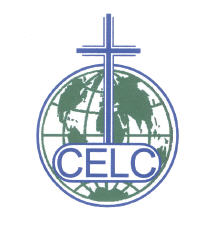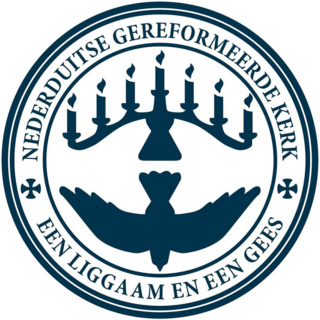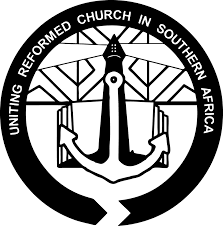Related Research Articles

The Presbyterian Church (USA), abbreviated PC (USA), is a mainline Protestant denomination in the United States. It is the largest Presbyterian denomination in the country, known for its liberal stance on doctrine and its ordaining of women and members of the LGBT community as elders and ministers. The Presbyterian Church (USA) was established with the 1983 merger of the Presbyterian Church in the United States, whose churches were located in the Southern and border states, with the United Presbyterian Church in the United States of America, whose congregations could be found in every state.

The Lutheran Church – Missouri Synod (LCMS), also known as the Missouri Synod, is a traditional, confessional Lutheran denomination in the United States. With 1.8 million members, it is the second-largest Lutheran body in the United States, behind the Evangelical Lutheran Church in America. The LCMS was organized in 1847 at a meeting in Chicago, Illinois, as the German Evangelical Lutheran Synod of Missouri, Ohio, and Other States, a name which partially reflected the geographic locations of the founding congregations.

The Wisconsin Evangelical Lutheran Synod (WELS), also referred to simply as the Wisconsin Synod, is an American Confessional Lutheran denomination of Christianity. Characterized as theologically conservative, it was founded in 1850 in Milwaukee, Wisconsin.

The Syro-Malankara Catholic Church, also known as the Malankara Syrian Catholic Church, is an Eastern Catholic sui iuris particular church in full communion with the worldwide Catholic Church possessing self-governance under the Code of Canons of the Eastern Churches. It is one of the major archiepiscopal churches of the Catholic Church. It is headed by Major Archbishop Baselios Cardinal Cleemis Catholicos of the Major Archdiocese of Trivandrum based in Kerala, India. With more than 1096 parishes, its one of India's biggest church evangelical establishments.
The Dutch Reformed Church was the largest Christian denomination in the Netherlands from the onset of the Protestant Reformation in the 16th century until 1930. It was the original denomination of the Dutch royal family and the foremost Protestant denomination until 2004. It was the larger of the two major Reformed denominations, after the Reformed Churches in the Netherlands was founded in 1892. It spread to the United States, South Africa, Indonesia, Sri Lanka, Brazil, and various other world regions through Dutch colonization. Allegiance to the Dutch Reformed Church was a common feature among Dutch immigrant communities around the world and became a crucial part of Afrikaner nationalism in South Africa.

The Syro-Malabar Church, also known as the Syro-Malabar Catholic Church, is an Eastern Catholic Church based in Kerala, India. It is a sui iuris (autonomous) particular Church in full communion with the Pope and the worldwide Catholic Church, including the Latin Church and the 22 other Eastern Catholic Churches, with self-governance under the Code of Canons of the Eastern Churches (CCEO). The Church is headed by the Major Archbishop of the Syro-Malabar, Raphael Thattil. The Syro-Malabar Synod of Bishops canonically convoked and presided over by the Major Archbishop constitutes the supreme authority of the Church. The Major Archiepiscopal Curia of the Church is based in Kakkanad, Kochi. Syro-Malabar is a prefix reflecting the church's use of the East Syriac Rite liturgy and origins in Malabar. The name has been in usage in official Vatican documents since the nineteenth century.

The Church of South India (CSI) is a united Protestant Church in India. It is the result of union of a number of Protestant denominations in South India that occurred after the independence of India.

The Confessional Evangelical Lutheran Conference (CELC) is an international fellowship of 34 Confessional Lutheran church bodies.

The Evangelical Lutheran Synod (ELS) is a US-based Protestant Christian denomination based in Mankato, Minnesota. It describes itself as a conservative, Confessional Lutheran body. The ELS has 130 congregations and has missions in Peru, Chile, India, South Korea, Ukraine, Czech Republic, and Latvia.

The Free Reformed Churches of Australia (FRCA) are a federation of 18 congregations, 16 in Western Australia, two in Tasmania and a home-congregation in Cairns. At the start of 2016 the total membership was 4,663. Their historical roots are in the Reformed Churches of the Netherlands (Liberated) as a result of post-World War II immigration, and their doctrinal roots are in the sixteenth-century Protestant Reformation and the Bible. The first congregation was in Armadale, Western Australia, founded in 1951.
The Ceylon Evangelical Lutheran Church (CELC), formerly known as Lanka Lutheran Church, is a Lutheran body in Sri Lanka. It is a denomination of around 5000 members and has been in fellowship with the Lutheran Church–Missouri Synod (LCMS) since 2001. It is a full member of the International Lutheran Council.

The Protestant Reformed Churches in America is a Protestant denomination of 33 churches and over 8,000 members.

The Dutch Reformed Church is a Reformed Christian denomination in South Africa. It also has a presence in neighbouring countries, such as Namibia, Eswatini, and parts of Botswana, Zimbabwe and Zambia. In 2013 it claimed 1.1 million members and 1,602 ordained ministers in 1,158 congregations.

The Uniting Reformed Church in Southern Africa was formed by the union of the black and coloured Nederduits Gereformeerde Kerk mission churches.
The Sudanese Reformed Presbyterian Churches (SRPC) are a unified body of Protestant Churches in Sudan.

This is a timeline of the history of the Syro-Malabar Catholic Church in India.
Elizabeth Paul was the first ordained woman in India. She was a sister of the CSI Order of Sisters in the Church of South India (CSI) who also taught at the United Theological College, Bengaluru.

The Reformed Churches in South Africa is a Christian denomination in South Africa that was formed in 1859 in Rustenburg. Members of the church are sometimes referred to as Doppers.
The Calvin Synod is an acting conference of the United Church of Christ, composed entirely of Reformed, or Calvinist congregations of Hungarian descent. Unlike much of the UCC, the Synod is strongly conservative on doctrinal and social matters, and many members of the "Faithful and Welcoming Movement," a renewal group acting to move the UCC in a more orthodox direction, belong to this body.